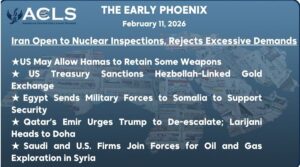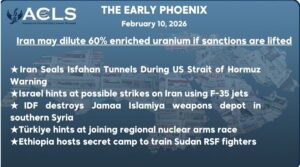★ SYRIA
-
Washington Shares Intelligence on ISIS with New Syrian Leadership
The United States has shared classified intelligence with Syria’s new leadership regarding threats posed by ISIS. According to senior officials cited by The Washington Post, U.S. intelligence recently helped thwart an ISIS plot targeting a religious shrine near Damascus earlier this month. This cooperation underscores ongoing efforts to combat ISIS activity in the region.
-
Saudi Foreign Minister Meets Syrian Leader in Damascus
Syrian leader received Saudi Foreign Minister Prince Faisal bin Farhan at the Presidential Palace following the latter’s visit to Lebanon. During the Davos Conference, Prince Faisal expressed “cautious optimism” about Syria, praising the new Syrian administration’s openness to international collaboration. He highlighted the administration’s alignment in public and private discourse and its decisive intent to engage constructively with the global community. This visit marks a significant diplomatic step in Saudi-Syrian relations.
-
Syria Seizes Weapons Shipment Destined for Hezbollah in Lebanon
Syrian authorities intercepted a weapons shipment intended for Hezbollah in Lebanon, according to the official SANA news agency. The operation occurred near the border city of Sarghaya, along established smuggling routes on the Lebanon-Syria border. Seized items included assault rifles, RPG launchers, and ammunition, as shown in released images. This action highlights efforts to disrupt arms smuggling in the region.
-
Rising Sectarian Violence as HTS Targets Syria’s Alawite Regions
Hayat Tahrir al-Sham (HTS) launched an offensive on Syria’s Alawite strongholds near the Mediterranean coast, heightening fears of renewed sectarian violence. Hundreds of HTS fighters advanced into the region, with clashes reported in Latakia and Homs. On Friday, HTS allegedly executed 13 Alawites in Homs, while ten HTS militants were killed in an ambush by Alawite gunmen near Jabla. An HTS military source stated the campaign aims to eliminate regime loyalist resistance, declaring such groups “no longer in control” of Syria. These developments underscore escalating tensions between rival factions.
============
★ TURKIYE
-
Erdogan: Turkey Pursues Progress After Eradicating Terrorism
President Recep Tayyip Erdogan declared Turkey’s commitment to eliminating terrorism, highlighting progress against PKK and post-Syria revolution opportunities. Speaking in Van, he emphasized unity across ethnic and religious lines and Turkey’s focus on realistic plans for long-term advancement. Erdogan expressed confidence in the “People’s Alliance” securing victory in the 2028 elections, ensuring stability and progress. Turkey aims to achieve a terrorism-free future while fostering national cohesion and sustainable development.
-
Turkey and Syria to Revive Free Trade Agreement
Turkey and Syria agreed to revive their 2011 Free Trade Agreement, focusing on enhancing trade, customs, and economic cooperation. Talks included industrial and agricultural trade, transit, reconstruction, and expanding Turkish product access across Syria. Turkish companies will play a key role in rebuilding efforts, while both nations aim to streamline border traffic and strengthen bilateral relations. This agreement signals a significant step toward economic recovery and collaboration following recent political changes in Syria.
-
Turkey Urges Unified Fight Against PKK and ISIS
Turkish Foreign Minister Hakan Fidan, during his visit to Baghdad, emphasized the necessity of a regional alliance to combat PKK and ISIS threats. He called on Iraq to officially recognize the PKK as a terrorist organization, highlighting its impact on Turkey, Iraq, and Syria. Fidan also warned about YPG activities in Syria, stressing Turkey’s readiness for cross-border operations if concerns remain unaddressed. Improved Turkish-Iraqi relations, supported by Baghdad’s PKK ban, have enabled high-level security talks, focusing on combating terrorism and ensuring regional stability.
-
Turkey Neutralizes 13 PKK Members During Strengthened Iraq Relations
Turkey announced neutralizing 13 PKK militants in northern Iraq during Foreign Minister Hakan Fidan’s visit to Baghdad. Fidan discussed combating terrorism and regional security with Iraqi and Kurdish leaders. Relations improved after Baghdad labeled PKK a “banned organization.” Turkey continues cross-border operations against PKK militants in Iraq while urging the disbandment of the YPG in Syria, viewed as the PKK’s affiliate. These efforts aim to enhance cooperation and regional stability following recent political shifts in Syria and Iraq.
-
Turkey Boosts Economy via Airspace Revenues and Iraq Trade
Turkey earned $700 million in airspace revenue in 2024 from 2.29 million flights, connecting 349 destinations across 132 countries. With active airports increasing to 58 and air transport agreements rising to 175 nations, Turkey is solidifying its position as a global aviation hub. Additionally, Turkish Foreign Minister Hakan Fidan announced $20 billion in trade with Iraq, emphasizing Turkey’s strategic partnership, support for Iraq’s Development Road Project, and commitment to fostering regional stability and economic growth.
============
★ ISRAEL
-
Trump Lifts Hold on Bomb Delivery to Israel
US President Donald Trump ended a hold by former President Biden on delivering 2,000-pound bombs to Israel, citing previous delays. Israel paid for the bombs, which had been stored during Biden’s term due to concerns about their use in Gaza. Foreign Minister Gideon Sa’ar praised Trump’s decision, emphasizing its importance for Israel’s defense. While Biden had continued other military aid, This reversal reinforces US-Israel defense cooperation during ongoing regional conflict and security challenges.
-
Iranian Hackers Escalate Cyberattacks on Israeli Infrastructure
Iranian hacker group Handala targeted 20 Israeli kindergartens, broadcasting rocket sirens and pro-terrorism songs. They also claimed to have breached the National Security Ministry, stealing sensitive data, though authorities found no evidence. Active since the Gaza conflict, Handala, linked to Iran, has repeatedly targeted Israeli infrastructure and private data, symbolizing rising cyber threats amidst regional tensions.
-
Constitutional Crisis Erupts Over Supreme Court Appointment in Israel
Justice Minister Yariv Levin rejected the appointment of Supreme Court President Yitzhak Amit, calling it “illegal” and boycotting the vote. Opposition leader Yair Lapid praised Amit’s selection as a win for democracy and urged judicial cooperation. Critics accuse the government of delaying the appointment to control the judiciary. The unprecedented boycott by Levin has deepened political tensions, leaving Israel grappling with a constitutional crisis and significant challenges to judicial independence and governance stability.
-
Israel Approves Seven New Ambassadors
The Israeli government approved seven ambassadors proposed by Foreign Minister Gideon Sa’ar. Yoram Elron will serve in Moldova, Walid Abu-Haya in Georgia, and Maya Kados in Hungary. Simon Seroussi was appointed to Ivory Coast, Burkina Faso, Benin, and Togo, while Yoav Bastritzky will head to Kazakhstan. Vivian Eisen will act as roving ambassador to North Macedonia, and Ruth Cohen-Dar to Malta and Slovenia. These appointments enhance Israel’s global diplomatic presence and strengthen international relations.
-
Israeli Shekel Strengthens During Ceasefire Optimism
The Israeli shekel hit its strongest level since February 2023, trading at NIS 3.541 before softening slightly to NIS 3.554. Bank of America credits recent ceasefire agreements for reducing risk premiums and boosting investor confidence. Analysts predict further shekel strengthening if stability continues, with potential interest rate cuts if inflation improves and supply chains recover. The shekel remains firm against the euro at NIS 3.696, reflecting positive economic sentiment and cautious fiscal strategies.
============
★ IRAN
-
Escalating Tensions Between Tehran and Baku as Azerbaijan Summons Iranian Diplomat
Azerbaijan summoned Iran’s chargé d’affaires following propaganda attacks during a religious council meeting in Iran’s Ardabil Province last December. Despite Iranian Supreme National Security Council Secretary Ali Akbar Ahmadian’s visit to Azerbaijan on January 8 and discussions with Azerbaijani President Ilham Aliyev emphasizing the importance of bilateral ties, the diplomatic crisis remains unresolved. Relations between Tehran and Baku continue to face significant challenges, further straining their diplomatic engagement.
-
Iranian-Afghan Talks Focus on Strengthening Relations and New Phase
Iranian Foreign Minister Abbas Araghchi discussed enhancing bilateral ties with top Afghan officials, focusing on migrant returns and water-sharing issues. Araghchi met with Afghan Prime Minister Mohammad Hassan Akhund and Foreign Minister Amir Khan Muttaqi, who expressed optimism for a “new momentum” and a “new phase” in bilateral relations. The Afghan Foreign Ministry highlighted these discussions in an official statement.
-
Iran Denies Requesting Direct Negotiations With United States
Iranian media denied reports claiming Tehran asked European diplomats to deliver a message to Washington about its readiness for direct negotiations. The Iranian Parliament’s National Security and Foreign Policy Committee held a meeting to discuss recent talks between Iranian deputy foreign ministers and their European counterparts in Geneva on January 13. According to the state-run ISNA news agency, Committee Spokesman Ibrahim Rezai refuted U.S.
-
Trade Between Iran and Germany Reaches €1.37 Billion in 11 Months
The total trade volume between Iran and Germany reached €1.37 billion from January to November 2024, reflecting a 4% increase compared to the same period in 2023, according to Germany’s Federal Statistical Office. German exports to Iran amounted to €1.16 billion during the first 11 months of 2024, marking a 6% increase from €1.09 billion in 2023. However, Iranian exports to Germany dropped by 6%, reaching €208 million compared to €222 million in the previous year.
============
★ ISRAEL-HAMAS WAR
-
Hamas Releases Four Israeli Soldiers Under Ceasefire Agreement
Hamas released four Israeli soldiers captured in October 2023, handing them to the Red Cross in Gaza. In exchange, Israel began freeing nearly 1,900 Palestinian prisoners, including 70 exiled outside Gaza and the West Bank, as part of a six-week ceasefire deal. The truce has facilitated humanitarian aid entry into Gaza, Addressing urgent needs during severe devastation and displacement. This prisoner exchange marks a key step in the ongoing negotiations mediated by Egypt, Qatar, and the US.
-
Trump Proposes Relocating Gaza Residents During Ceasefire
President Trump proposed relocating Gaza residents to Egypt and Jordan, citing Gaza’s destruction and chaos. He suggested building homes with Arab nations’ cooperation, discussing the idea with Jordan’s King Abdullah, and planning talks with Egypt’s President Sisi, despite Egypt’s rejection of displacement plans. The proposal aligns with a Gaza ceasefire involving prisoner exchanges and Israel’s conditions preventing displaced Palestinians’ return to northern Gaza, further complicating efforts to address the region’s ongoing humanitarian and political challenges.
-
Deal Finalized for Hostage Erbil Yehud and Palestinian Prisoners
Mediators secured an agreement for the release of Israeli hostage Erbil Yehud in exchange for 30 Palestinian prisoners. Yehud, held since October 2023, will be freed by Saturday. Israel had blocked displaced Palestinians from returning to northern Gaza, citing her release as a condition. The ceasefire, mediated by Egypt, Qatar, and the US, includes Israeli withdrawal, phased prisoner exchanges, and the return of displaced Palestinians, marking a key step toward easing tensions in the region.
-
Hamas Recruits Thousands During Gaza War Despite Losses
US intelligence shows Hamas recruited 10,000–15,000 fighters during the Gaza war, despite losing similar numbers in combat. Many recruits are young and untrained, performing basic security roles. Following the ceasefire, Israeli forces began withdrawing as negotiations on Gaza’s governance continued. While Hamas’s leadership and military infrastructure were severely damaged, officials warn the group remains a significant threat. Discussions are ongoing to determine the future of Gaza, with uncertainty over Hamas’s continued control.
-
Hamas Releases Footage of Israeli Losses, Rejects Trump’s Gaza Plan
Hamas’s Al-Qassam Brigade shared “Death Ambushes 2” footage, documenting attacks on Israeli forces in Beit Hanoun, including mine explosions, sniper operations, and a Merkava tank’s destruction, killing four soldiers. Since October 2023, over 840 Israeli soldiers have died, 405 during the ground invasion starting October 27. Meanwhile, Hamas and Islamic Jihad rejected US President Trump’s plan to relocate Gaza residents to Egypt and Jordan, urging Egypt and Jordan to oppose the proposal. A 42-day truce negotiation phase began last week.
-
Israeli Military Actions Escalate in Jenin and Gaza, Threatening Ceasefire Stability
Israeli forces intensified operations in Jenin, including a drone strike in Qabatiya that killed two Palestinians and destroyed their vehicle. The Jenin campaign has caused 14 deaths, 50 injuries, home demolitions, and evacuations, with the UN criticizing excessive force. Separately, Israeli troops injured five Palestinians near Al-Rashid Street as displaced residents awaited return under the ceasefire. Mediated by Qatar, Egypt, and the US, the fragile truce faces tension as Israel ties Palestinian return to releasing captive Israeli Erbil Yehud.
===============
★ IRAQ
-
Iraq Affirms Independence During Iran’s Regional Weakening
Iraq’s deputy parliament speaker, Mohsen al-Mandalawi, asserted that Iran’s diminishing influence in the region will not negatively impact Iraq. Speaking to Reuters, he emphasized Baghdad’s efforts to establish an independent diplomatic course and curb the influence of armed factions within its borders. His comments follow significant regional shifts, including the weakening of Iran-backed groups in Gaza and Lebanon, as well as the overthrow of Syria’s President Bashar al-Assad by rebel forces. Iraq aims to consolidate its sovereignty while navigating evolving regional dynamics.
-
Iraq Increases Oil Exports to United States by 66,000 Barrels
Iraq’s oil exports to the United States rose to 218,000 barrels per day last week, marking an increase of 66,000 barrels compared to the previous week’s 152,000 barrels per day. The US Energy Information Administration (EIA) reported that total US crude imports from nine major suppliers averaged 6.06 million barrels per day, up by 109,000 from the prior week’s 5.96 million barrels. This development highlights Iraq’s growing contribution to US crude oil imports within the broader context of rising demand.
-
Two Iraqi Border Guards Killed in Clash with PKK
Two Iraqi border guards were killed and one injured during clashes with Kurdistan Workers’ Party (PKK) fighters in Iraq’s Kurdistan region near the Turkish border. According to a border guard official, the incident occurred during a routine patrol in the village of Shilan when gunfire erupted between the patrol unit and PKK elements. This marks another violent episode in the ongoing tensions along Iraq’s northern borders.
============
★ YEMEN
-
Houthis Release Detainees During UN’s Call for Freedoms
The Houthis released 153 detainees in Yemen, supported by the Red Cross, while arbitrarily detaining seven UN staff. UN Secretary-General António Guterres condemned the detentions, urging immediate release and warning that such actions undermine humanitarian aid efforts for millions suffering in Yemen’s crisis. He called on the Houthis to honor commitments, ensure staff safety, and end obstructions to UN missions, as Yemen faces one of the world’s worst humanitarian and economic disasters.
-
Houthi Leader Threatens Escalation if Israel Violates Gaza Ceasefire
Houthi leader Abdul-Malik al-Houthi warned Israel of renewed escalation if it breaches the Gaza ceasefire agreement. In a televised speech marking the 20th anniversary of the death of his brother, former leader Hussein al-Houthi, stated that any Israeli violations, including resuming attacks or mass killings, would prompt retaliatory action. Al-Houthi emphasized the group’s close monitoring of the Gaza ceasefire implementation and developments in Jenin and the West Bank, signaling readiness to respond to any perceived aggression.
============
★ LEBANON
-
Macron, Aoun Discuss Ceasefire During Israeli Violations
French President Macron assured Lebanese President Aoun of efforts to uphold the Lebanon-Israel ceasefire, effective since November 27. Aoun condemned Israeli violations, including village destruction and blocking southern residents’ return. The agreement mandates Israel’s withdrawal within 60 days, yet Israel refuses compliance. Macron emphasized de-escalation, while Aoun called for international pressure to ensure Israel honors the agreement and safeguards southern Lebanese residents’ stability and safe return to their homes.
-
Israel Kills 22 Lebanese, Bans Return to 66 Southern Villages
Israeli forces killed 22 Lebanese, including a soldier, and injured 124 during clashes as civilians attempted to return to southern villages. The military imposed a ban on returning to 66 border villages, violating the ceasefire agreement mandating troop withdrawal by Sunday. Lebanese President Aoun urged calm and reaffirmed sovereignty, while UNIFIL condemned the violence. The UN warned that unstable conditions are hindering safe returns and called for immediate de-escalation to prevent further escalation and preserve the ceasefire agreement’s fragile stability.
-
Lebanon-Israel Ceasefire Extended During Negotiations
The White House announced extending the Lebanon-Israel ceasefire until February 18, with talks on Lebanese prisoners’ return ongoing. Lebanese Prime Minister Najib Mikati reaffirmed sovereignty and urged full Israeli withdrawal. Israel stated its forces would remain in five border points past the original 60-day deadline. The ceasefire, under UN Resolution 1701, aims to stabilize the region after a 13-month conflict that caused thousands of casualties and widespread displacement.
===============
★ GULF NATIONS
-
Qatar Mediates Agreement for Gaza Displaced Return, Hostage Release
Qatar announced a new agreement between Hamas and Israel, enabling the return of displaced Gaza residents to northern areas starting Monday. According to Qatari Foreign Ministry spokesperson Majed Al-Ansari, Hamas will release hostage Erbil Yehud and two others by Friday, followed by three additional hostages on Saturday, as part of the deal. Hamas has also provided intermediaries with a list of prisoners to be freed during the ceasefire’s first phase, per the agreement’s terms. In exchange, Israel will allow displaced individuals to return to northern Gaza beginning Monday morning.
-
Qatar and Russia Discuss Regional Crises and Ukraine Mediation
Qatar’s Prime Minister Sheikh Mohammed bin Abdulrahman Al Thani and Russian Foreign Minister Sergey Lavrov discussed Gaza, Syria, and the Ukraine crisis. Talks emphasized strengthening bilateral relations and Qatar’s efforts to reunite families affected by the Ukraine conflict. Sheikh Mohammed reaffirmed Qatar’s commitment to peaceful solutions through diplomatic dialogue, highlighting its role in fostering international stability and addressing global challenges.
-
Italy and Saudi Arabia Sign $10 Billion Cooperation Agreements
Italian Prime Minister Giorgia Meloni announced signing agreements worth $10 billion with Saudi Arabia, covering infrastructure, energy, technology, and defense sectors. Following extensive discussions with Saudi Crown Prince Mohammed bin Salman, Meloni emphasized the agreements’ goal of elevating bilateral ties to a strategic partnership. She highlighted the significant untapped potential in the relationship between the two nations, signaling a broader
future collaboration.
-
Kuwait’s New Oil Discoveries Boost Energy Potential
Kuwait announced two major offshore oil discoveries, including 4 billion barrels and 600 billion cubic feet of gas. These discoveries align with Kuwait Petroleum Corporation’s strategy to achieve 4 million barrels of daily production by 2035, requiring $300 billion in investments. Recent successes, including the Jalaiha and Nukhatha fields, strengthen Kuwait’s global energy standing and commitment to future sustainability. The discoveries highlight Kuwait’s growing role as a key player in the global energy market with vast hydrocarbon resources.
============
★ EGYPT & North Africa
-
Egypt Signs Agreement With BP to Restart Anode Blocks Factory
Egypt signed an agreement on Sunday with BP Energy España to restart the Anode Blocks factory in Ain Sokhna after two years of inactivity. Minister of Public Enterprises Mohamed Shimi stated that the contract aligns with the ministry’s efforts to enhance production capacity, boost operational rates, and support the national economy. He highlighted that the factory’s operation will reduce import reliance for its final product, which is crucial for industrial companies, especially aluminum manufacturers. The agreement aims to increase productivity and meet domestic market needs.
-
Sudanese Investments in Egypt Estimated at $240 Million
The head of Egypt’s Commercial Representation Authority, Minister Plenipotentiary Yehia Al-Wathiq Billah, revealed the value of Sudanese investments in Egypt. Speaking at a business forum hosted by the General Authority for Investment and Free Zones, he stated that Sudanese investments in Egypt are estimated at $240 million. Meanwhile, Egyptian investments in Sudan amount to approximately $1 billion, and trade volume between the two countries reached $1.4 billion in 2023.
-
Egypt Rejects Displacement of Palestinians Following Trump’s Proposal
Egypt announced on Sunday its rejection of relocating Palestinians outside their land, warning of regional instability and urging a two-state solution. The statement by Egypt’s Foreign Ministry followed U.S. President Donald Trump’s proposal to move Palestinians from Gaza to Egypt and Jordan, citing uninhabitable conditions in Gaza caused by Israeli actions.
-
Fighting in Sudan Causes Fire at Largest Oil Refinery
The Al-Jaili refinery, capable of processing 100,000 barrels daily, caught fire during clashes, emitting thick black smoke over Khartoum. Satellite data analyzed by the Associated Press on Saturday confirmed the fire at Sudan’s largest refinery. The Sudanese army announced it regained control of the state-owned refinery, operated by China’s National Petroleum Corporation. The facility, located 60 kilometers north of Khartoum, had remained largely intact until Thursday.
===========




